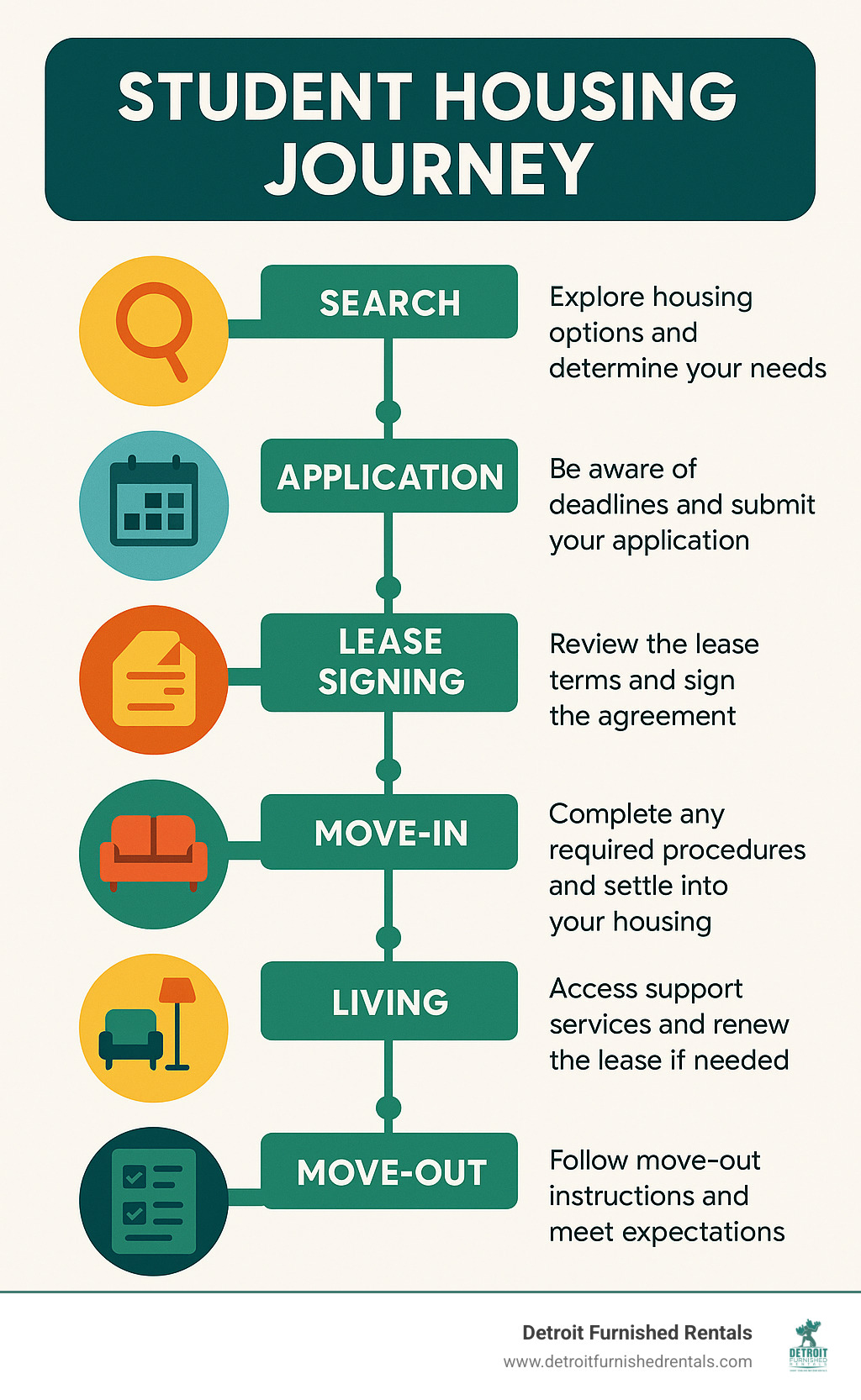Finding Your Perfect Student Housing Accommodation
Student housing accommodation comes in several main types to fit different budgets and lifestyles:
On-Campus Options:
– Residence halls – Traditional dorms with shared facilities and meal plans
– Suites – Semi-private rooms with shared common areas
– University apartments – Full kitchens and more independence
Off-Campus Options:
– Private apartments – Shared or individual units near campus
– Homestays – Living with local families for cultural immersion
– Purpose-built student housing – Modern complexes designed for students
Key Factors to Consider:
– Location and campus proximity
– Budget and what’s included (utilities, internet, meal plans)
– Lease terms and flexibility
– Roommate preferences and privacy needs
Finding the right student housing can make or break your college experience. Studies show that students in campus housing perform better academically and report higher satisfaction than commuters. But with rising costs and limited availability, many students are exploring off-campus alternatives that offer more flexibility and space.
The housing search process can feel overwhelming – especially for international students or those unfamiliar with lease terms, roommate matching, and application deadlines. Understanding your options early gives you the best chance of securing quality accommodation.

Basic student housing accommodation vocab:
– graduate student housing
– international student housing
– student friendly apartments
Everything You Need to Know About Student Housing Accommodation
Choosing the right student housing accommodation is like picking the perfect study spot – it needs to match your personality, support your goals, and feel like home. Today’s students can choose from everything from traditional residence halls to modern apartments, each offering unique benefits.

Residence Halls, Suites & Apartments
Traditional residence halls are the classic college experience. You’ll typically share a room with one roommate, use communal bathrooms, and have access to dining halls. Meal plans mean you’ll never worry about groceries, and academic support is built right into the building – study groups form naturally in common areas.
Suite-style living gives you the best of both worlds. You’ll have your own private bedroom but share a bathroom and common area with just a few other students. It’s like having roommates without sharing your actual sleeping space.
University apartments are where independence meets convenience. These come with full kitchens, separate bedrooms, and typically house 2-4 students. You’ll cook your own meals and manage your own schedule, but still have all campus resources nearby.
Shared, Private or Entire Place?
Shared rooms are the most budget-friendly choice and most social. You’ll share your space with a roommate, which means late-night conversations and built-in study partners.
Private rooms hit the sweet spot for many students. You get your own bedroom sanctuary but still share bathrooms, kitchens, and living areas with others.
Entire place rentals give you complete control over your environment. Your own bathroom, kitchen, and living room – but at premium prices.
Homestays & Family Housing
Homestays offer something completely different. Living with a host family means joining a household, which can be incredibly valuable for international students wanting to experience local culture.
Graduate students with families have unique housing needs. Many universities provide family housing with multiple bedrooms, full kitchens, and proximity to childcare facilities.
Choosing the Right Student Housing Accommodation Type
Your lifestyle preferences should drive your decision. Lease length can make or break your flexibility. Furnished versus unfurnished options impact both your wallet and moving logistics. Pet policies vary dramatically, so research this early if you have or want a furry companion.
Budgeting, Bills & Value for Money
Understanding the true cost of student housing accommodation means looking beyond that rent price and examining what you’ll actually pay each month.

Typical Costs & What’s Included
Average rent varies wildly by location and type. In major university cities, expect anywhere from $800 to over $2000 per month. Budget-friendly markets offer options starting around $275 per week.
Many providers now bundle everything into one monthly payment. Bundled utilities typically include electricity, water, gas, and internet. Wi-Fi inclusion has become standard, but speeds and data limits vary.
Hidden costs love to surprise students: application fees, administrative charges, late payment penalties, cleaning fees, parking permits, and campus recreation fees.
Money-Saving Hacks & Scholarships
Subletting during summer months can slash yearly costs. Off-peak leasing during spring semester often yields better rates. Look for coupon codes and promotional offers – some platforms offer discounts up to 30%. Early bird applications frequently come with reduced rates or waived fees.
For flexible options that won’t break the bank, consider Affordable options that might offer better value than traditional student housing.
Pros & Cons of Living On-Campus vs Off-Campus
On-campus living wins for convenience – you can roll out of bed and make it to class in minutes. Community events and programming create natural ways to meet people.
Off-campus living gives you more bang for your buck and independence. You choose your groceries, set your schedule, and have friends over without residence hall policies. But commute times and transportation costs become real considerations.
Privacy and space usually favor off-campus options, while budgeting flexibility varies – on-campus offers predictable payments, off-campus offers more control over spending choices.
Application, Roommate Matching & Legal Must-Knows
The application process for student housing accommodation has become increasingly competitive. Understanding deadlines, requirements, and strategies can make the difference between securing your preferred housing and settling for leftovers.
Applying for Student Housing Accommodation: Step-by-Step
Housing application deadlines are non-negotiable. Universities often guarantee housing for students who apply by their deadline, but late applicants face uncertainty.
Priority windows give first dibs to returning students, those with disabilities, international students, or participants in specific programs. Research whether you qualify for any priority categories.
Don’t panic if you end up on a wait-list. Students change their minds constantly, especially during summer months. Early-bird strategies include submitting applications the moment they open and having all required documents ready to upload.
Roommate Matching & Platforms
Modern matching systems use detailed surveys about sleep schedules, cleanliness habits, and study preferences. Be brutally honest – nobody benefits from pretending to be someone you’re not.
RoomSync, SpareRoom, and Diggz are popular platforms. University Facebook groups can also be goldmines for finding roommates. Most housing providers offer conflict resolution resources when roommate situations go sideways.
Lease Terms, Deposits & Cancellation Policies
Lease length decisions impact your flexibility. Academic year leases align with school schedules but leave you scrambling for summer housing. Security deposits typically range from a few hundred dollars to a full month’s rent.
Early exit clauses are lifesavers when life throws curveballs. Most students need guarantors because they don’t have established credit history.
Disability & Special Needs Requests
Students with disabilities have strong legal protections under ADA and Section 504 rights. Accommodation forms require medical documentation and specific details about needed modifications. Processing takes 2-4 weeks, so submit requests early.
International Student Checklist
Credit history alternatives include larger security deposits or guarantor arrangements. Visa timelines must align with housing arrangements. Scam warnings are especially important – never send money before seeing accommodations. Proof of funds requirements include bank statements or scholarship letters.
For comprehensive housing comparisons, consider exploring the Marketplace to compare options to evaluate different providers and locations.
Location, Safety & Amenity Deep-Dive
Choosing the right location for your student housing accommodation is like picking the perfect home base. You want somewhere safe, connected to campus life, and with access to everything you need.
Popular Student Neighborhoods in Major University Cities
Downtown Detroit has become a hot spot for students, especially those at Wayne State University. The area’s change over the past decade has been remarkable – now buzzing with coffee shops, art galleries, and affordable loft apartments. Students love the urban energy and proximity to internships.
Westwood near UCLA captures that classic college town vibe. Santa Monica offers the California dream for students willing to deal with longer commutes. Miami’s Brickell attracts students who want to feel like young professionals. Cambridge in the UK shows how centuries-old university towns create special magic.
Safety, Security & Wellbeing
Quality student housing accommodation takes security seriously. 24/7 staffing provides peace of mind with resident advisors and security personnel available around the clock. Key-card entry systems are more secure than traditional keys and easily replaceable when lost.
CCTV coverage in lobbies and common areas helps everyone feel safer without being intrusive. Mental health support has become just as important as physical security, with many providers offering crisis support hotlines and counseling services.
Resources to Search & Compare Housing
University housing portals should be your first stop – these guarantee legitimate listings and often integrate with financial aid. Facebook groups for your university can provide insider information from current students. Third-party platforms offer broader search capabilities but require healthy skepticism.
For students considering alternatives to traditional campus housing, exploring Off-Campus choices can reveal options that offer better value, more flexibility, and amenities that campus housing might not provide.
Move-In, Move-Out & Ongoing Support
Move-in day marks the beginning of your student housing accommodation journey. There’s a lot to learn once you’re actually living there.

Important Dates & Procedures
Move-in weekends are coordinated like military operations, with specific time slots to prevent chaos. Early arrival programs cost extra but provide peace of mind for international students or athletes.
Holiday closures catch many students off guard – some residence halls shut down during winter break. Move-out inspections determine whether you’ll see your security deposit again. Document everything when you move in with photos of any existing damage.
Support Services After You Arrive
Resident advisors are trained to help with roommate conflicts, homesickness, and academic stress. Mental health support has become a priority in student housing. Community programming is often where you’ll meet your closest college friends.
Know how to report maintenance support issues and understand what constitutes an emergency versus routine request.
Staying Flexible with Short & Mid-Term Rentals
Month-to-month arrangements cost more but offer incredible flexibility for unpredictable schedules. Subletting can help maintain your housing while pursuing opportunities elsewhere, but understand your lease terms completely.
For students who need maximum flexibility, exploring Short stays can provide adaptability that traditional student housing accommodation often lacks.
Frequently Asked Questions about Student Housing Accommodation
How far in advance should I apply for housing?
The student housing accommodation application game is all about timing. Most successful students start their housing search 6-12 months ahead. University housing applications typically open in late fall for the following academic year.
International students need even more lead time – sometimes 8-10 months in advance due to visa processing and limited spots. But don’t panic if you’re applying late – waitlists move throughout the summer as students change plans.
What documents do international students need to secure a lease?
International students need valid passport and visa documentation, plus I-20 or DS-2019 forms proving student status. You’ll need bank statements showing you can pay rent and proof of enrollment from your university.
Many landlords require guarantors for international students without US credit history. Larger security deposits are common – often 2-3 months’ rent instead of one month.
Can I change rooms or roommates mid-semester?
Room changes are possible but not guaranteed. Common reasons for approved changes include documented roommate conflicts, medical needs, academic program changes, or safety concerns.
The process involves meeting with housing staff and completing formal requests. Emergency situations involving safety get processed faster than convenience-based requests. Approved changes are subject to availability and might involve fees.
Conclusion
Finding the right student housing accommodation is one of the most important decisions you’ll make during college. It’s about creating a foundation that supports your academic success, personal growth, and overall well-being.
The housing landscape offers incredible variety, from busy residence halls where friendships form over late-night study sessions to quiet apartments where you can focus without distractions. What matters most is being honest about who you are and what you need to thrive.
Your housing choice isn’t set in stone. Many students find their needs change as they progress through college. The freshman who loves residence hall community might crave independence as a junior.
Budget considerations will always play a role, but don’t let cost be your only deciding factor. Sometimes paying more for the right location can save money in transportation and lifestyle expenses.
For students who need maximum flexibility – whether dealing with uncertain schedules, internship opportunities, or wanting fully equipped accommodations – Detroit Furnished Rentals offers pet-friendly, fully furnished apartments that serve as smart off-campus alternatives. Our accommodations provide flexibility and comfort that traditional student housing accommodation sometimes can’t match. Find availability and book today at our Off-Campus Student Housing page.
Your college years represent a unique time of exploration and findy. The right housing choice provides more than shelter – it offers a launching pad for trips, a quiet retreat for studying, and a comfortable space where you can be yourself. Trust your instincts about what feels right for your lifestyle and goals.





